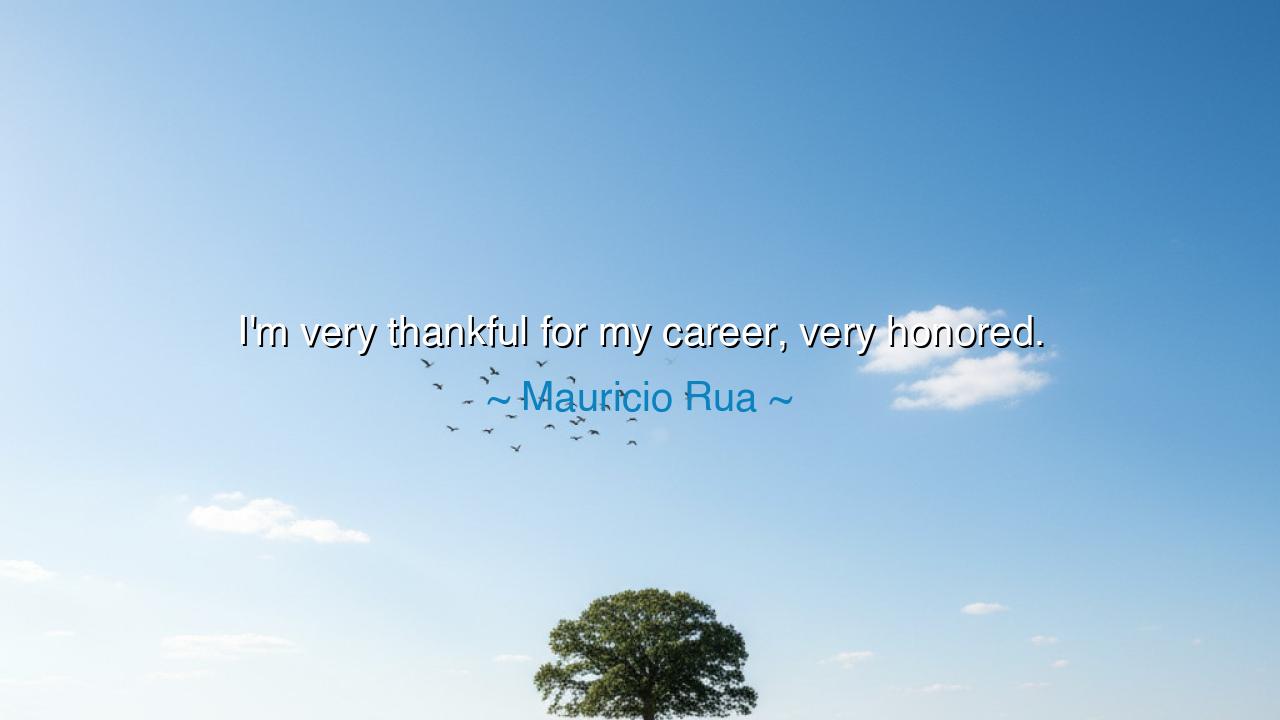
I'm very thankful for my career, very honored.






Mauricio Rua once declared with humility and strength: “I’m very thankful for my career, very honored.” These words, though simple, carry the fragrance of deep wisdom. For in an age where men boast of victories and possessions, it is rare to hear a warrior speak not of conquest but of gratitude. Rua’s saying is a reminder that the true crown of life is not merely in what one achieves, but in how one honors the journey, the people, and the fate that shaped it.
The ancients, too, understood this spirit of thankfulness. When Roman generals returned from great campaigns, they rode in triumph, but before them was carried a reminder of mortality: a slave whispering, “Remember, you are only a man.” Even in glory, humility was demanded. Rua’s words echo this same eternal lesson. To be honored by one’s career is to recognize that no victory is achieved by strength alone, but by the blessings of opportunity, the guidance of mentors, and the endurance of spirit granted by providence.
Consider the story of Marcus Aurelius, emperor and philosopher. Though he commanded vast armies and ruled over an empire, he often wrote of gratitude—to his teachers, to his parents, to the gods, and even to hardship itself. He knew that the throne was not merely his achievement, but a trust. In like manner, Rua’s humility reminds us that even the path of the fighter, forged in sweat and sacrifice, is still a gift to be held with thankfulness, not arrogance.
The deeper meaning of Rua’s words is this: that career is not merely a profession, but a calling, a destiny. Many toil in labor without joy, but the one who can look back and say, “I am thankful,” has lived richly indeed. For to be honored by one’s life’s work means that it has not only brought personal triumph, but also respect, inspiration, and legacy. Gratitude transforms achievement from mere success into lasting greatness.
We must also see in these words a challenge. Too often, men and women reach heights only to scorn the path that led them there, or to crave more without pausing to give thanks. This is folly. For the heart that does not practice gratitude becomes restless, insatiable, and hollow. Rua teaches us that to pause, to give honor to the journey, is itself a victory greater than any trophy. For trophies tarnish, but thankfulness endures in the soul.
The lesson, then, is clear: to live well is to cultivate gratitude for one’s path, whether it be filled with applause or silence. Honor your work, however humble. Be thankful for the teachers who guided you, the trials that strengthened you, and the failures that taught you resilience. Even hardship may be honored, for it chisels the spirit into strength. In this way, your career—whatever shape it takes—becomes not a burden but a sacred trust.
Practical wisdom may be given. Each day, pause and name what you are thankful for in your work. Acknowledge not only your victories but the struggles that made them possible. Speak words of gratitude to those who walk beside you, for no path is walked alone. And when the world tempts you to pride, answer with humility, saying: “I am honored, for my career is not mine alone—it is the fruit of many hands, much sacrifice, and the favor of fate.”
Thus, Rua’s words stand as a teaching for all: “I’m very thankful for my career, very honored.” They remind us that humility is the highest form of greatness, that gratitude sanctifies all labor, and that true honor is not seized but received with reverence. Let all who labor, whether in fields or in halls of power, remember this truth: the path itself is a gift, and to walk it with gratitude is to live a life worthy of remembrance.






AAdministratorAdministrator
Welcome, honored guests. Please leave a comment, we will respond soon